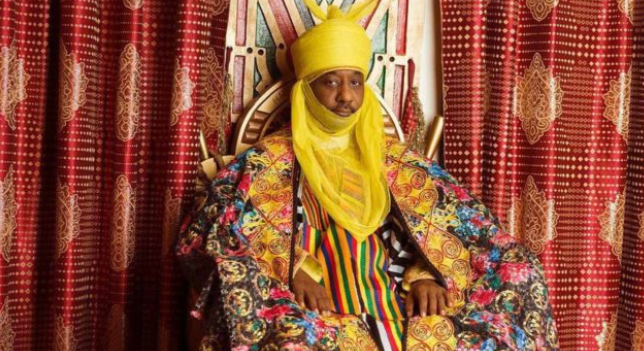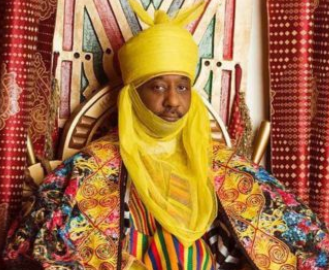
• Ex-monarch sues DSS, IGP, others
• Soyinka lashes out at Ganduje
• Varsity postpones honour for ex-emir
Even though President Muhammadu Buhari has denied any role in the ordeal of former Kano Emir Muhammadu Sanusi, stakeholders are unrelenting in pointing out that he should stop his security operatives from being used to detain the deposed traditional ruler.
Besides, Nobel laureate, Wole Soyinka, yesterday rated the protagonist and antagonist in the Kano royal crisis. In an article, ‘For Whom The Gates Open Wide’, Soyinka said the conduct of Kano State Governor Umar Ganduje, “apart from the innate travesty of justice in this recent move, is on a par with the repudiated colonial order, one that out-feudalised feudalism itself, and is synonymous with authoritarianism of the crudest temper.” He noted that Ganduje’s action “has proved one of the worst examples of a system that enables even the least deserving to exercise arbitrary, unmerited authority that beggars even the despotism of the most feudalistic traditional arrangements.”
He describes Ganduje as a protagonist of a ‘progressive’ order that enjoys near-absolute immunity, thus, “even when it has disgraced its status and violated its oath of office, caught literally with its pants down in open defecation, it can still pretend to act in the interest of progress, modernity and public well being. Such are the ironies raised by the purported dethronement of the Emir of Kano, Mohammed Sanusi, with one stroke of a pen!”
On the contrary, Soyinka praised the strides of the former emir. He writes: “Emir Sanusi was a one-man EFCC sanitisations squad in the banking system taking on the powerful corrupters of that institution. Unblinking, he trod on the interests of powerful beneficiaries of a worm-infested sector and, in the process, created permanent enemies. By contrast, confidence in immunity has catapulted his tormentor to the ranks of the most notorious public faces of the disorder that Sanusi strove to eradicate.”
Soyinka said he did not have the feeling that the palace gates of the Kano emirate had been “definitively slammed against this Islamic scholar, royal scion and seasoned economist. It is just a feeling. Closed and barred, or merely shut however, the doors of enlightened society remain wide open to Muhammad Sanusi.”
But the Nobel laureate has these words for Ganduje: “As for his current crowing Nemesis, a different kind of gate remains yawning to receive him when, as must, the days of governorship immunity finally come to an end. Those whom the gods would destroy, they first make mad. The list is long, there are comrades in impunity awaiting their day of reckoning. The files remain open, and the nation remains on the watch. The wheels of justice grind slowly, but sooner or later, they arrive.”
In its own reaction, the Human Rights Writers Association of Nigeria (HURIWA) blamed Buhari for the continued detention of Sanusi.
It urged the president to release him forthwith and stop portraying Nigeria as a medieval cave whereby law and order are breached with reckless abandon.
“The so-called banishment of citizen Sanusi Lamido Sanusi against constitutional norms, laws and practices, has brought unquantifiable global opprobrium on Nigeria and is a disgraceful policy that has made the current administration the topmost candidate for the award of global infamy and disrepute,” HURIWA said in a statement yesterday in Abuja.
Signed by National Coordinator Emmanuel Onwubiko, the statement said: “It does not make sense for anybody to attempt to exonerate President Muhammadu Buhari from the gross breach of the fundamental human rights of the immediate past Emir of Kano Mallam Sanusi Lamido Sanusi. There is indeed no logic or rational basis for any attempt at deploying sophistry to try to exonerate the president.”
The rights body maintained that as Commander-in-Chief of the Armed Forces of Nigeria and as head of the executive arm of government, which supervises the Department of State Services (DSS) and other para-military and policing institutions, Buhari is to blame for the violation of Sanusi’s rights.
It stated that by virtue of the provisions of Section 218(1) (2) (3) and 215(1) (2) and (3) of the 1999 Constitution of the Federal Republic of Nigeria (as amended), the president is empowered by the constitution as head of the command and control infrastructures of the armed forces and police. It alleged that that the police and other security forces were actively involved in the violations of the former emir’s rights, especially Section 14, which reads: “Every citizen of Nigeria is entitled to move freely throughout Nigeria and reside in any part thereof, and no citizen of Nigeria shall be expelled from Nigeria or refused entry thereby or exit therefrom.”
It also cited articles from the Universal Declaration of Human Rights (UDHR) allegedly violated by Buhari: “(Article 1) we are all born free. We all have our own thoughts and ideas and we should all be treated the same way; (Article 2) the rights in the UDHR belong to everyone, no matter who we are, where we’re from, or whatever we believe; (Article 4) no one should be held as a slave, and no one has the right to treat anyone else as their slave;
“(Article 5) No one has the right to inflict torture, or to subject anyone else to cruel or inhuman treatment; (Article 6) we should all have the same level of legal protection whoever we are, and wherever in the world we are; (Article 7) the law is the same for everyone, and must treat us all equally.”
Also, the Socio-Economic Rights and Accountability Project (SERAP) sent “an urgent complaint to the United Nations Working Group on Arbitrary Detention over the arbitrary detention and degrading treatment of deposed Emir of Kano, Muhammadu Sanusi II.”
The complaint was addressed to Mr. José Guevara Bermúdez, chairman/rapporteur of the Working Group.SERAP said the arrest and continued detention of Sanusi is a gross violation of his human rights. It noted that under the Nigerian Constitution, 1999 (as amended) and international law, the Nigerian and Kano State authorities have violated Sanusi’s right to be free from arbitrary detention; the right to freedom of movement; and the right to due process of law.”
In the complaint dated March 11, 2020 and signed by SERAP’s deputy director, Kolawole Oluwadare, the organisation said: “The detention of Emir Sanusi constitutes an arbitrary deprivation of his liberty because it does not have any legal justification. The detention also does not meet minimum international standards of due process.”
SERAP also argued: “A detention is arbitrary when it is clearly impossible to invoke any legal basis justifying the deprivation of liberty. Article 9(1) of the International Covenant on Civil and Political Rights, which confirms the right to liberty and freedom from arbitrary detention, guarantees that no one shall be deprived of his liberty except on such grounds and in accordance with such procedure as are established by law.”
Sanusi, meanwhile, has reportedly filed a suit (FHC/ABJ/CS/357/2020) before the Federal High Court in Abuja, challenging his detention. The respondents are: Attorney General of the Federation, Kano State Attorney General, Director General of the Department of State Service and Inspector General of Police.
In another protestation, former Kaduna State Governor Balarabe Musa said: “What happened to Sanusi is not unexpected. But, honestly, it is callous. It is illegal and callous in the sense that you cannot remove a traditional leader just like that simply because you have power.” He said Buhari should have prevented Ganduje from taking the action, considering the country’s current security challenges.
Also, the chairman, Board of Trustees of the Peoples Democratic Party (PDP), Walid Jibrin, noted: “What happened in Kano recently where the governor, within two hours, dethroned the first class emir and banished him to far away Nasarawa State is very disturbing.”
In another development, the Nnamdi Azikiwe University (NAU) Awka, Anambra State, yesterday postponed its honorary doctoral degree award to former Kano Emir Sanusi Lamido.
Vice Chancellor Prof. Charles Esimone, who announced that the award would be conferred on Sanusi at a future ceremony, praised the deposed monarch, saying: “I can tell you that Sanusi has contributed a lot to education in Nigeria and to this institution. It was while he was the governor of the Central Bank that most structures in this institution were erected, through his efforts.”
